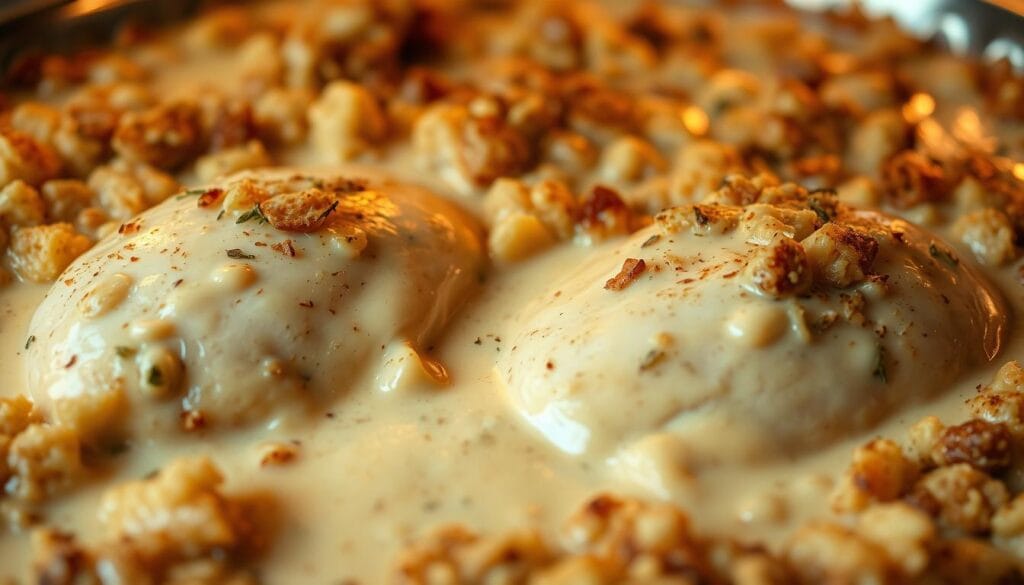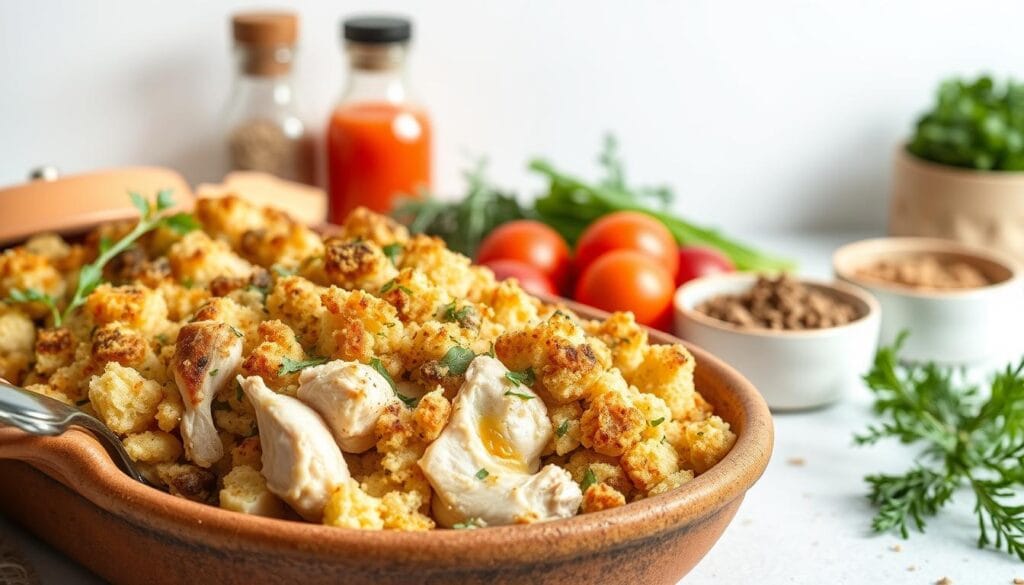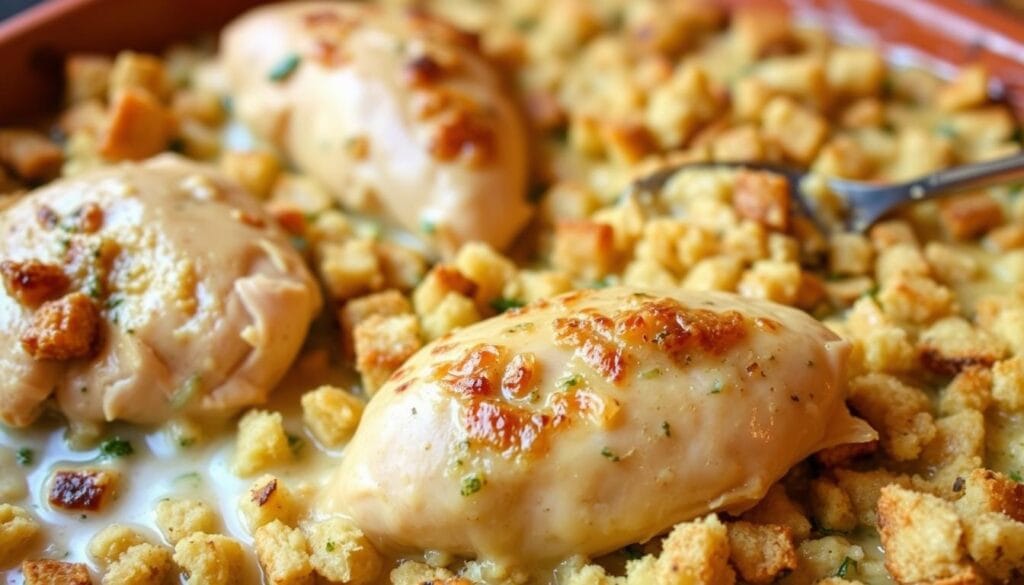Comfort food at its finest, a warm, satisfying chicken and stuffing casserole is a dish that brings families together. As the weather cools down, the craving for a hearty, homemade meal grows. You might be wondering, what’s the secret to making the perfect homemade chicken stuffing bake that your family will love?
A good casserole recipe is more than just a list of ingredients; it’s about creating a dish that’s both nourishing and delicious. With a few simple steps, you can create a mouth-watering meal that’s sure to become a staple in your household.
Table of Contents
The Comfort Food Classic: Understanding Chicken and Stuffing Casserole
Chicken and stuffing casserole is a timeless favorite. It’s a staple in many American homes. It offers a hearty meal that’s simple to make.
The History and Appeal of This American Favorite
The traditional chicken stuffing casserole comes from classic American cooking. It mixes chicken with the rich taste of stuffing. It brings back memories of family dinners and cozy nights.
Its appeal is in how easy it is to make. It needs just a few ingredients. This makes it an easy chicken stuffing casserole that’s hard to say no to.
Why This Dish Deserves a Place in Your Recipe Collection
Chicken and stuffing casserole is a versatile dish. It can be changed to suit different tastes and diets. You can add different seasonings, veggies, or bread types.
This flexibility, along with its comforting taste, makes it a great addition to your cooking. It keeps your meals interesting and satisfying.
Essential Ingredients for a Perfect Chicken and Stuffing Casserole
The secret to a tasty chicken and stuffing casserole lies in the ingredients. To make the best chicken stuffing recipe, start with the basics.
Selecting the Right Chicken Cuts
Choosing the right chicken is key for a great casserole. You have several options to choose from.
Fresh vs. Frozen Chicken Options
Fresh chicken is often preferred for its texture and taste. If you use frozen, make sure it’s thawed before cooking.
White Meat vs. Dark Meat Considerations
White meat chicken, like breasts, is leaner. Dark meat, like thighs, is juicier and tastier. Your choice depends on what you like best.
Stuffing Options: Store-Bought vs. Homemade
The stuffing is a key part of your casserole. You can buy it or make it yourself. Homemade lets you add your own touches and use fresher ingredients.
Binding Ingredients and Flavor Enhancers
To make a creamy chicken and stuffing bake that’s both cohesive and flavorful, use binding ingredients like eggs or cream. Add herbs and spices for extra taste. These elements tie the dish together and add depth.
- Eggs or cream for binding
- Herbs like thyme or sage for added flavor
- Spices to taste
By picking these ingredients carefully, your chicken and stuffing casserole will be both satisfying and delicious.
Kitchen Equipment You’ll Need
Before you start cooking your chicken and stuffing casserole, make sure you have the right tools. The right equipment makes cooking easier and more fun.
Casserole Dish Selection and Preparation
A 9×13-inch baking dish is the best size for chicken and stuffing casseroles. It helps with even layering and cooking. Choose a glass or ceramic dish for even heat.
Don’t forget to grease the dish well. This prevents the casserole from sticking.
Other Helpful Tools and Utensils
You’ll need more than just a casserole dish for your delicious chicken and stuffing dish. A big mixing bowl, a sharp knife, and a measuring cup are must-haves. A wooden spoon or spatula is great for mixing and layering your savory chicken stuffing recipe.
Preparing Your Chicken for the Casserole
Getting your chicken ready is key to a flavorful chicken stuffing casserole. How you cook and shred your chicken affects the taste and texture of your dish.
Pre-Cooking Methods: Poaching, Roasting, or Rotisserie
You can choose from several ways to pre-cook your chicken. Poaching keeps the chicken moist and preserves its flavor. Roasting adds a richer taste and texture. A rotisserie chicken is quick and easy, as it’s already cooked.
Make sure your chicken is cooked to 165°F (74°C) no matter the method. This is important for safety and the quality of your casserole.
Proper Shredding and Cutting Techniques
After cooking, shred or cut your chicken into pieces for the casserole. Use two forks to shred it, or a sharp knife for bite-sized pieces. Aim for uniform pieces for even distribution in your casserole.
Creating the Perfect Stuffing Base
Making the perfect stuffing base is key for a tasty homemade chicken stuffing bake. The stuffing base is the heart of your dish, adding texture and flavor that goes well with the chicken.
Traditional Bread Stuffing Preparation
Traditional bread stuffing is a favorite for chicken and stuffing casserole. Start with stale bread, like day-old white or whole wheat. Tear it into small pieces and toast until lightly browned and crispy. This makes the bread better at holding flavors.
Tip: Stale bread is best because it’s drier and soaks up flavors better than fresh bread.
Aromatics and Herbs That Elevate Your Stuffing
Aromatics and herbs are important for a flavorful stuffing. Onions, celery, and garlic add depth. Saute them until soft and fragrant. Herbs like sage, thyme, or parsley can also boost the flavor. Use fresh or dried herbs, whichever you prefer.
“The secret to a great stuffing is in the balance of flavors and textures.”
Achieving the Ideal Moisture Level
Getting the right moisture is crucial for a great stuffing. The bread should be moist but not soggy. Adjust the broth or stock to get the right consistency. Start with a little and add more as needed.
| Ingredient | Quantity | Purpose |
|---|---|---|
| Bread | 4 cups, cubed | Base of the stuffing |
| Onions | 1 cup, chopped | Adds flavor and aroma |
| Celery | 1/2 cup, chopped | Enhances texture and flavor |
By focusing on these elements, you can make a stuffing base that’s both tasty and textured. This will make your homemade chicken stuffing bake or easy chicken stuffing casserole a true comfort food classic.
The Creamy Element: Sauce Options for Your Casserole

The creamy sauce is key to a tasty chicken and stuffing bake. It brings all the flavors together. This makes the dish a true comfort food classic.
Classic Cream of Chicken Soup Base
Cream of chicken soup is a simple and classic choice. It’s easy to mix with other ingredients for a smooth sauce. This method is quick and needs just a few extra ingredients.
Homemade Sauce Alternatives
If you want something unique, try homemade sauce alternatives. You can make a sauce that matches your chicken and stuffing perfectly.
Roux-Based White Sauce
A roux-based white sauce is a timeless choice. It’s made with butter, flour, and milk or cream. This method gives you a creamy texture that you can season as you like.
Broth-Based Alternatives
Or, you can use a broth-based sauce. It’s lighter and can be made with chicken or vegetable broth. This is perfect for those who prefer a less rich sauce.
Dairy Additions for Extra Richness
Adding dairy like sour cream or Greek yogurt can make it creamier. These add depth and a tangy flavor. They make your casserole even more tasty.
Step-by-Step Chicken and Stuffing Casserole Recipe
Let’s make a tasty chicken and stuffing casserole. This dish is loved by many in America. Follow these steps to make a casserole that everyone will enjoy.
Layering Techniques for Maximum Flavor
The secret to a great casserole is layering. Start with a sauce layer at the bottom to prevent sticking. Then, add cooked chicken, followed by stuffing. Keep layering until you use up all the ingredients, ending with stuffing on top.
Adding sautéed veggies or herbs between layers boosts flavor. It also adds texture and depth.
Baking Times and Temperature Guidelines
It’s important to bake at the right temperature and time. Preheat your oven to 350°F (175°C). Cover the casserole with foil and bake for 25-30 minutes. Then, remove the foil and bake for another 10-15 minutes, until the top is golden and the casserole is hot.
Watch the casserole closely during the last 15 minutes. The top can burn quickly.
Visual Cues for Doneness
Check for these signs to know if your casserole is done: the top should be golden, and it should be hot and bubbly. If using a meat thermometer, the chicken should be at 165°F (74°C). These signs mean your casserole is ready.
By following these steps, you’ll make a delicious chicken and stuffing casserole. It will become a family favorite.
Delicious Variations to Try
While the classic recipe is a staple, there are countless ways to put a twist on your chicken and stuffing casserole. Experimenting with new ingredients can breathe fresh life into this comfort food classic.
Adding Vegetables for Nutrition and Color
Incorporating vegetables not only enhances the nutritional value but also adds color and texture. Consider adding steamed broccoli, sautéed mushrooms, or diced bell peppers to create a more balanced dish.
Cheese Varieties That Complement the Dish
Cheese can significantly elevate the flavor profile of your casserole. Options like cheddar, Swiss, or Parmesan can be sprinkled on top for a golden, cheesy crust. Mixing different cheeses can also create a rich and complex flavor.
Regional and Seasonal Adaptations
Adapting the recipe to regional or seasonal ingredients can keep the dish exciting and relevant. For example, adding cranberries or stuffing with sage during the holidays, or incorporating fresh herbs in the spring, can give the casserole a timely twist.
| Variation | Ingredients | Season/Region |
|---|---|---|
| Broccoli Addition | Broccoli, cheddar cheese | Any |
| Holiday Twist | Cranberries, sage | Winter Holidays |
| Spring Refresh | Fresh herbs (parsley, thyme) | Spring |
Nutritional Information and Dietary Adaptations

Making your favorite chicken and stuffing casserole healthier is easier than you think. By understanding the nutritional aspects and making a few simple adaptations, you can enjoy this comfort food classic while catering to various dietary needs.
Making Your Chicken and Stuffing Casserole Healthier
To make your homemade chicken stuffing bake healthier, consider the following adjustments:
- Use leaner cuts of chicken to reduce saturated fat content.
- Opt for whole grain bread instead of white bread for your stuffing.
- Increase the vegetable content by adding more herbs and sautéed vegetables.
- Reduce the amount of cream or use low-fat alternatives.
These tweaks not only enhance the nutritional profile but also maintain the flavor and comfort associated with the dish.
Gluten-Free and Dairy-Free Options
For those with dietary restrictions, adapting your best chicken stuffing recipe to be gluten-free or dairy-free is straightforward:
- Replace traditional bread with gluten-free bread or cornbread for the stuffing.
- Use gluten-free broth or stock.
- For dairy-free versions, substitute cream with non-dairy milk or cream alternatives.
- Be mindful of the ingredients in your canned soup or sauce mixes, opting for gluten-free or dairy-free versions as needed.
These adaptations ensure that everyone can enjoy this beloved casserole, regardless of dietary restrictions.
Portion Control and Serving Suggestions
Controlling portion sizes is key to maintaining a balanced diet. Serve your chicken and stuffing casserole in moderate portions, accompanied by a side salad or steamed vegetables to round out the meal. This approach not only aids in portion control but also adds variety and nutrients to your meal.
Serving Your Chicken and Stuffing Casserole Recipe
Now that you’ve made your easy chicken stuffing casserole, it’s time to think about what to serve with it. Serving this dish is more than just putting it on the table. It’s about making a complete meal that everyone will love.
Complementary Side Dishes
Choosing the right side dishes can make your savory chicken stuffing recipe even better. Try serving it with roasted veggies like carrots, Brussels sprouts, or asparagus. These add color and nutrition to your meal. A simple green salad or garlic bread can also enhance the casserole.
- Roasted vegetables (carrots, Brussels sprouts, asparagus)
- Green salad with a light vinaigrette
- Garlic bread or dinner rolls
Presentation Tips for Family Meals and Gatherings
Presentation is key when serving your easy chicken stuffing casserole, especially for family gatherings or special occasions. Add a pop of color with fresh herbs like parsley or thyme. You can serve it straight from the casserole dish or on a decorative platter.
Storage, Freezing, and Reheating Guidelines
Keeping your chicken and stuffing casserole tasty after storage and reheating is easy. Just follow a few simple steps. This is true whether you have leftovers or are making it ahead of time. The right handling keeps its flavor and texture just right.
Proper Cooling and Refrigeration Methods
First, let your casserole cool down completely. This step stops bacteria from growing. After it’s cooled, wrap it tightly with plastic wrap or foil. Then, put it in the fridge within two hours of cooking. It can stay good in the fridge for 3-4 days.
Freezer-Friendly Preparation Tips
If you want to keep it longer, freeze your casserole. Just freeze it before baking. When you’re ready, thaw it in the fridge overnight and bake as usual. Or, freeze it in portions for a quick meal. Use airtight containers or bags to avoid freezer burn.
Best Practices for Reheating Without Drying Out
To reheat without drying, cover it with foil and bake at 350°F (175°C) until warm. You can also reheat parts in the microwave. Just cover with a safe lid or plastic wrap and use low power to avoid overheating.
Conclusion: Mastering the Art of Homemade Chicken and Stuffing Casserole
Now you know how to make a tasty chicken and stuffing dish. Follow the steps in this article to create a flavorful casserole. It will quickly become a favorite in your family.
The secret to a great casserole is using high-quality ingredients and careful preparation. Choosing the right chicken and making the perfect stuffing base are key. Each part is important for the final dish.
With time, making a homemade chicken and stuffing casserole will become easy. Try adding different vegetables or cheeses to make it your own. This way, you can make the dish unique to your taste.
Learning to make this classic dish will not only please your family. It will also help you develop a valuable cooking skill. This skill will benefit you for many years.

